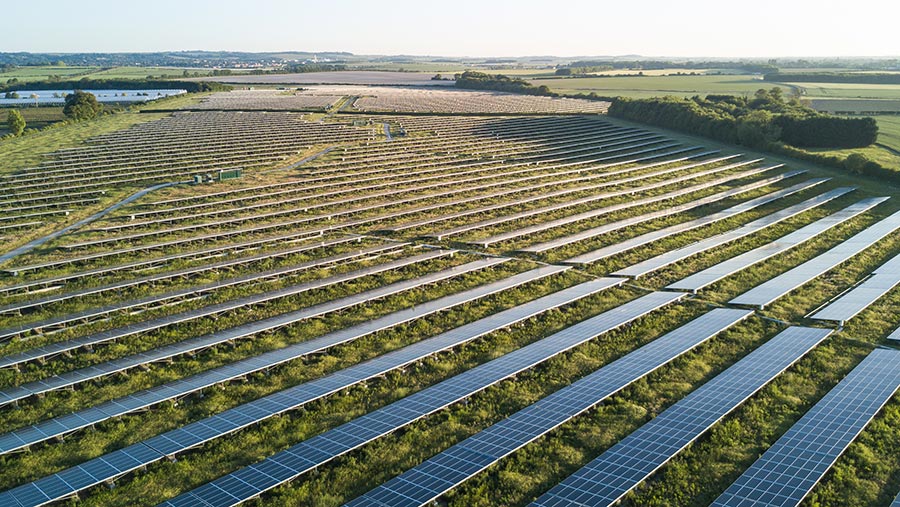Large-scale solar farms a threat to food security, MPs warn
 © Jamesh77/Adobe Stock
© Jamesh77/Adobe Stock MPs have challenged the government to introduce stricter controls to ensure large-scale solar projects are not built on good agricultural land, threatening domestic food security.
There are fears that large-scale solar projects in the pipeline will blight the countryside and lead to the loss of swathes of productive farmland.
During a Westminster Hall debate on Wednesday (9 March), MPs warned that a balance must be struck between using land for solar energy and food production.
See also: Plans for UK’s largest solar farm threaten food production
Following Russia’s invasion of Ukraine and land grab, the government urgently needs to reassess wheat supplies and ensure that more food is grown locally, while contributing to net-zero targets, several MPs warned.
Although many councils support solar farms, MPs are concerned about several large-scale projects being proposed by developers.
Mallard Pass project
The Mallard Pass solar farm in Lincolnshire, spanning 880ha, is eight times the area of the UK’s current largest solar farm – the 101ha Shotwick Solar Park in Flintshire. It is one of a dozen large solar farms at planning stage.
I wonder if the Hon Member for Spelthorne @KwasiKwarteng will be attending the Westminster Hall debate tomorrow about large scale solar farms? Here’s the 2,175 acre stain that’s Mallard Pass plonked on Staines. A stain that’ll abuse productive agricultural land in Lincs & Rutland pic.twitter.com/Gw2wmmL5Zn
— MallardPassActionGroup (@MallardPassAG) March 8, 2022
Others include: the Cottam Solar Project on the Nottinghamshire and Lincolnshire border, which covers 1,133ha and the Gate Burton energy park, near Gainsborough, Lincolnshire, spanning 684ha.
Brendan Clarke-Smith, Conservative MP for Bassetlaw, highlighted the work of the “No Solar Desert” campaign group, which has attracted 5,200 signatures for an online petition urging government to produce a farmland protection policy to regulate the loss of farmland to solar.
He told the debate the threat to agricultural land was the “crux of the problem” in his Nottinghamshire constituency.
“With the situation in Ukraine at the moment, we have to look to our wheat supplies, and we want to source more of our food locally, because that contributes to reaching net zero, which is important too,” he said.
Planning guidance
Mr Clarke-Smith noted that planning practice guidance states that solar farms should be focused on “previously developed and non-agricultural land… that it is not of high environmental value”.
He warned against a “wild-west style gold rush”, with developers looking to increase the value of their land and profits.
Neil Parish, Conservative MP for Tiverton and Honiton, said the “terrible situation” in Ukraine meant “not much food would be produced in that breadbasket of the world”.
https://twitter.com/neil_parish/status/1501597684712587271
Therefore, the UK needs to produce more wheat and grain for pigs and poultry to ensure good food and high-quality animal welfare.
Mr Parish said it was “highly laudable” that government was asking farmers to improve biodiversity, but this would reduce food production.
“We can have energy, but for goodness sake let us put the panels on people’s homes and industrial sites, and not on more good agricultural land,” he stressed.
Human rights concerns
Alicia Kearns, Conservative MP for Rutland and Melton, said the Mallard Pass solar project was being proposed by Canadian Solar, a de facto Chinese company “seeking to infiltrate our country with Uyghur blood labour”.
“They are putting Uyghur people into concentration camps and using them to build solar panels, and I will not see those imposed on Rutland,” she added.
Ms Kearns called for a national policy on solar farms to “make sure we protect our natural environment and ability to feed our people”.
Planning applications for solar projects in England below 50MW are determined by the local planning system, and those above made by the secretary of state for Business, Energy and Industrial Strategy.
George Freeman, parliamentary under secretary of state in the Department for Business, Energy and Industrial Strategy, said the government was reviewing national policy statements for energy, including renewables and solar projects, following a consultation.
Planning guidance was clear that large-scale solar farms should focus on previously developed and non-greenfield land, he added.
